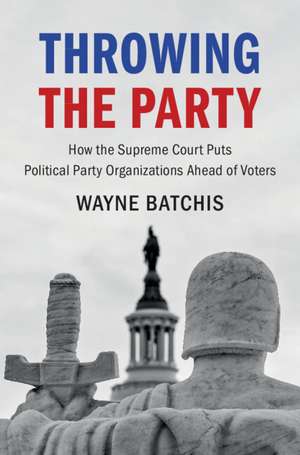Throwing the Party: How the Supreme Court Puts Political Party Organizations Ahead of Voters: Cambridge Studies on Civil Rights and Civil Liberties
Autor Wayne Batchisen Limba Engleză Paperback – 29 iun 2022
| Toate formatele și edițiile | Preț | Express |
|---|---|---|
| Paperback (1) | 266.76 lei 6-8 săpt. | |
| Cambridge University Press – 29 iun 2022 | 266.76 lei 6-8 săpt. | |
| Hardback (1) | 695.06 lei 6-8 săpt. | |
| Cambridge University Press – 29 iun 2022 | 695.06 lei 6-8 săpt. |
Preț: 266.76 lei
Nou
Puncte Express: 400
Preț estimativ în valută:
51.05€ • 54.58$ • 42.56£
51.05€ • 54.58$ • 42.56£
Carte tipărită la comandă
Livrare economică 17 aprilie-01 mai
Preluare comenzi: 021 569.72.76
Specificații
ISBN-13: 9781009095853
ISBN-10: 1009095854
Pagini: 350
Dimensiuni: 151 x 231 x 13 mm
Greutate: 0.38 kg
Ediția:Nouă
Editura: Cambridge University Press
Colecția Cambridge University Press
Seria Cambridge Studies on Civil Rights and Civil Liberties
Locul publicării:New York, United States
ISBN-10: 1009095854
Pagini: 350
Dimensiuni: 151 x 231 x 13 mm
Greutate: 0.38 kg
Ediția:Nouă
Editura: Cambridge University Press
Colecția Cambridge University Press
Seria Cambridge Studies on Civil Rights and Civil Liberties
Locul publicării:New York, United States
Cuprins
Part I. Foundations: 1. Introduction; 2. The Supreme Court's approach to political parties; 3. The association versus the individual; Part II. Party Primaries: 4. Setting the stage; 5. Primaries and the party in the electorate: the right to vote; 6. Double standards: organizations over individuals and major over minor parties; 7. Doubling down on the party organization in service of the major parties; Part III. The Party, the Court, and Campaign Finance Law: 8. Party speech through money; 9. An ill-fitting party campaign finance jurisprudence; 10. Parties and the current campaign finance landscape; Part IV. Passé Equal Protection and a Way Forward; 11. Party and equality; 12. The political question: is there room for equal protection in partisan gerrymandering?; 13. A potential solution: the party system as a public forum; 14. Conclusion.
Recenzii
'Wayne Batchis's Throwing the Party synthesizes the disparate threads of the Supreme Court's political-party jurisprudence and puts that doctrine into conversation with the political science literature. Lawyers and political scientists will learn a lot about how the other field views the world after reading this terrific book.' Travis Crum, Associate Professor of Law, Washington University in St. Louis, former law clerk to Justices Anthony Kennedy and John Paul Stevens on the U.S. Supreme Court
'Political parties are private organizations with profoundly public effects. We value their rights of association while recognizing major competing First Amendment interests. Professor Batchis deftly navigates this complicated and important area of law with clarity and nuance, offering a thoughtful way forward as we think about the proper legal framework for political parties in this era of intense partisanship.' Derek T. Muller, Professor of Law, Bouma Fellow in Law, University of Iowa College of Law
'Political parties are private organizations with profoundly public effects. We value their rights of association while recognizing major competing First Amendment interests. Professor Batchis deftly navigates this complicated and important area of law with clarity and nuance, offering a thoughtful way forward as we think about the proper legal framework for political parties in this era of intense partisanship.' Derek T. Muller, Professor of Law, Bouma Fellow in Law, University of Iowa College of Law
Notă biografică
Descriere
From primaries to gerrymandering, this book scrutinizes and offers a proposed solution to the Supreme Court's problematic political parties' jurisprudence.









